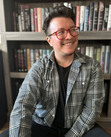Gabe Cole Novoa's Blog, page 15
June 20, 2017
Vlog: On Writing and Music
Another question asked, another question answered. Today I'm talking about what I listen to while I write and edit—and why.
RELATED LINKS:
My Writing HabitsHow to Finish a WIPDo You Have to Write Every Day?
What are your music preferences while writing?
Twitter-sized bite:





RELATED LINKS:
My Writing HabitsHow to Finish a WIPDo You Have to Write Every Day?
What are your music preferences while writing?
Twitter-sized bite:
From bands to soundtracks to headphones and more, @Ava_Jae shares their music preferences while writing. (Click to tweet)





Published on June 20, 2017 04:00
June 19, 2017
Discussion: Top 5 TBR
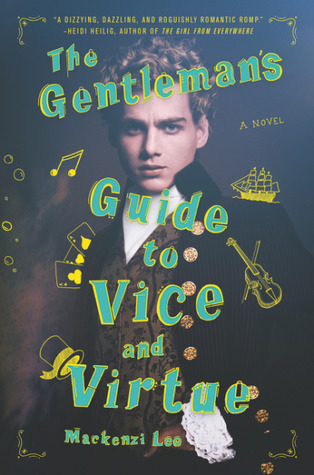 Photo credit: GoodreadsSo while I haven't had as much time (or motivation, if I'm being honest) to read as I would like, as of late, and I'm hopelessly behind on my Goodreads reading challenge, I still do have a schedule of books I'm itching to dive into, as always. Because while the never-ending TBR list is overwhelming, some books I own eventually find their way to the top for more immediate reading.
Photo credit: GoodreadsSo while I haven't had as much time (or motivation, if I'm being honest) to read as I would like, as of late, and I'm hopelessly behind on my Goodreads reading challenge, I still do have a schedule of books I'm itching to dive into, as always. Because while the never-ending TBR list is overwhelming, some books I own eventually find their way to the top for more immediate reading.My top five TBR right now includes:
A Gathering of Shadows & A Conjuring of Light by V.E. Schwab. Technically I'm cheating by including both books, but I'm nearing the end of my A Gathering of Shadows re-read (because it is a re-read) anyway. Next up will be A Conjuring of Light because the whole point of re-reading AGOS was to have everything fresh in my mind for ACOL. And honestly, I'm just impressed I haven't run into ACOL spoilers yet. (*knocks on wood*)
Mask of Shadows by Linsey Miller. I am super blessed because I managed to get my hands on a Mask of Shadows ARC which immediately leapt to the top of my TBR pile because I've been dying to get this book since I first sneakily heard about it before the publication announcement was up. Which is to say forever ago, or at least, it feels that way. But I have a copy, so you can bet I'll be reading this as soon as I'm done with the Shades of Magic trilogy.
The Gentleman's Guide to Vice and Virtue by Mackenzie Lee. Technically this isn't out yet but I have a pre-order and I figure it'll be out by the time I finish AGOS, ACOL, and Mask of Shadows. (Given how long I've been re-reading AGOS, it's a pretty safe bet.) Anyway! This is another I've been super excited about since I saw the pub announcement and I'm absolutely delighted it's been getting reviewed so well because I really want to love it. And judging by the sample I heard already, I'm sure I will. :D
The Girl From Everywhere & The Ship Beyond Time by Heidi Heilig. Cheating again with two books here, but like AGOS, my The Girl From Everywhere read is a re-read. I originally read TGFE way back in 2015 as an ARC, so I definitely want a refresher before I dive into my beautiful copy of The Ship Beyond Time. I expect it'll be a fun re-adventure.
Wildcard. Obviously this isn't a book, but I'm letting myself cheat because technically I already have six books on this list. I'm not quite sure what I'll read after I get through this list, but I have a pretty large selection of unread books I own, so that won't be a problem. But I suppose it'll depend on my mood after I've read these books. Whatever I settle on, I'm sure it'll be excellent. :)
What books are on your top five TBR?
Twitter-sized bite:
What books are on your top five TBR? Join the discussion on @Ava_Jae's blog. (Click to tweet)





Published on June 19, 2017 04:00
June 16, 2017
6 Most Common Critiques
 Photo credit: freestocks.org on FlickrI've been freelance editing for over a year now, and in that time I've written a lot of edit letters. Which is great, because it means I've had the opportunity to read and critique a lot of work, which I've really enjoyed.
Photo credit: freestocks.org on FlickrI've been freelance editing for over a year now, and in that time I've written a lot of edit letters. Which is great, because it means I've had the opportunity to read and critique a lot of work, which I've really enjoyed.It also means, over time, I've noticed quite a few patterns in the critiques I frequently end up giving, because there are trends in the issues many manuscripts I've worked with have had. These trends are things I figure would be helpful for writers to look for while revising on their own, so I thought I'd share them.
So without further ado, here are the six most common critiques I have for manuscripts and samples I've read over the last thirteen months. In no particular order...
Filtering/telling emotion. I did say this list is in no particular order but this is definitely my #1 most common critique. As I've talked about here before, filtering is a form of telling that often subtly distances the narrative, and removing the amount of filtering can make the narrative feel more intimate. Same goes for telling emotion—rather than stating how characters are feeling, it's much, much more effective to consider how those emotions affect your characters physically and consider how they affect your characters' thoughts. Then by writing those physical and psychological effects, your readers can intuit what emotions your characters are feeling without ever being told. Which again, makes the narrative feel closer and more immediate.
POV issues. There are several POV issues I frequently come across, namely: too many POVs, POV slips, and adult POVs in YA manuscripts. The first two kind of go together: I frequently remind my clients they should only use as many POVs as they need to tell the story, and it's not uncommon that when there are too many POVs in a story, the POVs also kind of slip together—meaning POV will switch within a scene without any transition, which is confusing and hard to read. The last point is pretty YA-centric, but I've on several occasions come across adult POVs in YA manuscripts, which isn't really allowed in YA. YA, after all, is a teen category for teen readers and their stories are supposed to be told by teens. Save the adult POVs for adult books, because they largely don't belong here.
What is the protagonist's goal? This is a pretty big plot issue and it's not uncommon. Sometimes I'll go through a manuscript and it won't be clear until halfway through, or the last act, or later, what the protagonist's goal is—but that's way too late to introduce a goal. The protagonist's goal should be clear right from the beginning. It's okay if their goal changes over time, but the protagonist must always have something to strive for—without that goal, the plot and pacing falls flat.
Voice issues. Given that I edit YA and NA, voice is especially paramount, and a frequent critique I have especially for YA works is that the voice doesn't quite sound like a teen. This is hard to nail, especially at first, and my biggest suggestion for fixing that is to read a ton of YA. But it's also a matter of constantly reminding yourself that you, the adult author, aren't the one telling the story—your teen characters are.
Action tag + dialogue tag. This a pretty easy to fix—but common—one. When writing dialogue, you only need an action tag or a dialogue tag—not both for the same line. So rather than saying, "'I hate you,' she said with a smile," you can say, "'I hate you.' She smiled" and get the same point across in less words. It's a trick to help cut down on wordiness. And speaking of which...
Wordiness. Line editing is really my forte, so it's not surprising that I pretty nearly always find wordiness to cut in a manuscript. I already did a post on things to look for to cut down on wordiness though, so I'll refer you to that.
So that covers my most common critiques. Do you catch any of these in your own work?
Twitter-sized bite:
Author & freelance editor @Ava_Jae shares their most common critiques. Do you catch these in your own work? (Click to tweet)





Published on June 16, 2017 04:00
June 14, 2017
Fixing the First Page Giveaway #36!
 Photo credit: Sophe89We're just about halfway through June which means we're halfway through 2017! Which is...really weird to think about! But it also means, of course, it's time for the next Fixing the First Page feature, which happens to be the 36th feature, which means we've been doing this for three years!
Photo credit: Sophe89We're just about halfway through June which means we're halfway through 2017! Which is...really weird to think about! But it also means, of course, it's time for the next Fixing the First Page feature, which happens to be the 36th feature, which means we've been doing this for three years!Very weird.
For those who’ve missed before, the Fixing the First Page features is a public first 250 word critique. Using the lovely rafflecopter widget, anyone interested in winning a public (as in, featured in a post on this blog) first page critique can enter.
For an example of what this critique will look like, here's the last Fixing the First Page post.
Rules!
ONLY the first 250 words will be critiqued (up to finishing the sentence). If you win and send me more, I will crop it myself. No exceptions.
ONLY the first page. I don’t want 250 random words from your manuscript, or from chapter 3. If you win the critique and send me anything other than the first 250 words of your manuscript, I will choose someone else.
I will actually critique it. Here. On the blog. I will say things as nicely as I can, but I do tend to be a little blunt. If you’re not sure you can handle a public critique, then you may want to take some time to think about it before you enter.
Genre restrictions. I'm most experienced with YA & NA, but I will still accept MG and Adult. HOWEVER. If your first page has any erotic content on it, I ask that you don’t enter. I want to be able to post the critique and the first 250 in its entirety without making anyone uncomfortable, and if you win and you enter a page with erotic content, I will choose someone else.
You must have your first page ready. Should you win, you need to be able to submit your first page within 48 hours of my contacting you to let you know you won. If 48 hours pass and I haven’t heard from you, again, I will choose someone else.
You’ll get the most out of this if it isn’t a first draft. Obviously, I have no way of knowing if you’re handing me a first draft (though I will probably suspect because it’s usually not that difficult to tell). I won’t refuse your page if it’s a first draft, but you should know that this critique will likely be of more use if you’ve already had your betas/CPs look over it. Why? Because if you don’t, the critique I give you will probably contain a lot of notes that your betas & CPs could have/would have told you.
There will not be a round 2 (unless you win again in a future contest). I hate to have to say this, but if you win a critique, it’s NOT an invitation to send me a bunch of your revisions. I wish I had the time available to be able to look at revisions, but sadly, I don’t. If you try to break this rule, I will nicely say no, and also remember to choose someone else should you win a second contest. Which would make me sad. :(
So that’s it! If you’re okay with all of the above and would like to enter to be the thirty-fifth public critique on Writability, do the thing with the rafflecopter widget below. You have until Wednesday, June 21 at 11:59 PM EST to enter!
a Rafflecopter giveaway





Published on June 14, 2017 04:00
June 13, 2017
Vlog: On Writing Description
You've asked, I'm answering: how do you write description? How much description is too much or too little? I'm sharing my thoughts on this essential part of novel writing.
RELATED VLOGS:
World Building Part 1First to Final Draft: BEYOND THE REDOn Writing Distinctive POVs
What tips would you add for writing description?
Twitter-sized bites:





RELATED VLOGS:
World Building Part 1First to Final Draft: BEYOND THE REDOn Writing Distinctive POVs
What tips would you add for writing description?
Twitter-sized bites:
How much description is too much? How much is too little? @Ava_Jae vlogs some tips. (Click to tweet)
Struggling to get your description right? @Ava_Jae shares some tips in today's vlog. (Click to tweet)





Published on June 13, 2017 04:00
June 12, 2017
What Should You Focus On While First Drafting?
 Photo credit: Brian Stetson on FlickrI've frequently talked about how first drafts are meant to be terrible, and how I worry about nothing while first drafting except getting the story down. I've said time and time again that anything messy in the first draft can be fixed with revisions, but you can't edit a blank page, so getting the words down first is the most important thing.
Photo credit: Brian Stetson on FlickrI've frequently talked about how first drafts are meant to be terrible, and how I worry about nothing while first drafting except getting the story down. I've said time and time again that anything messy in the first draft can be fixed with revisions, but you can't edit a blank page, so getting the words down first is the most important thing.But what's involved in "getting the story down"? What should you focus on getting on the page, rather than saving it for later?
As is the case with many things in writing, this answer is going to vary writer-to-writer. But after completing sixteen first drafts, this is what I've learned to focus on while getting the story down for the first time:
The plot. Technically I worry about this while plotting, not first drafting, but the first draft is where I take note of whether or not the plot is working as it should be. A lot of times I can't really tell for sure whether the plot is working the way I wanted it to until the first read through and revisions, but while first draft I at least get a sense of the flow and the way one scene leads into another and how they stack up together.
The characters. The first draft is really where I get to know the characters for the first time. This is where their personalities start to shine, where their interactions with other characters tells me about them, where I get glimpses into who they are and what makes them tick. By the end of the first draft, I don't have a full picture of my full cast of characters, but I usually have a pretty good idea of how the main cast behaves and how they get along (or don't).
The story. Ultimately, the first draft is where I follow a lot of gut feelings. It's not uncommon for my plotted scene card to say one thing and the scene itself to turn out another way entirely. Arguments happen where I didn't plan them—and so does kissing—flirting crops up between characters I didn't expect, and sometimes new plot ideas hit me along the way. I pretty near always follow those gut instincts and go wherever the story takes me, regardless of whether or not I'd planned for it before. And sixteen first drafts later, I've yet to regret going with what felt right as I wrote rather than with what I'd originally planned.
So those are the main things I try to keep in mind when putting words on the page for the first time. What do you focus on while first drafting?
Twitter-sized bite:
What do you focus on while first drafting? @Ava_Jae shares some experience and thoughts. (Click to tweet)





Published on June 12, 2017 04:00
June 9, 2017
7 Diverse Fall 2017 Books I'm Psyched About
Somehow, the fall 2017 publication season is not that far away. Earlier in the year I did a diverse books for 2017 post, but I only covered the first half of the year, so now it's time to take a look at the books going forward that sound amazing.
I've been psyched about most of these for quite some time. Because they sound incredible.
Without further ado, here are seven I'm looking forward to:
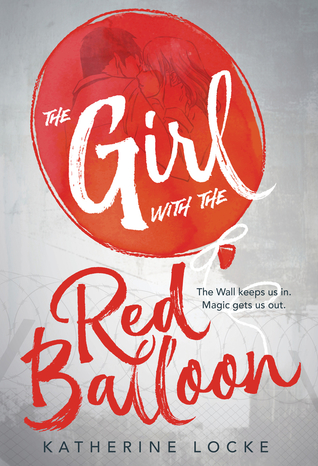 Photo credit: Goodreads
Photo credit: Goodreads
The Girl with the Red Balloon by Katherine Locke (September 1)
YA Historical Fantasy
Goodreads summary:
Diversity note: Ellie is Jewish (#ownvoices).
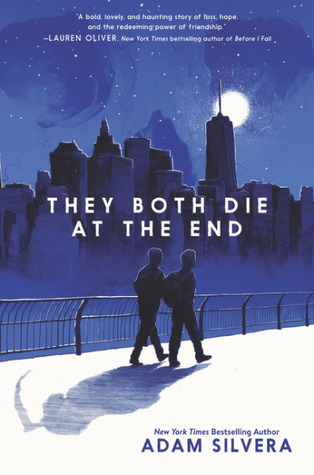 Photo credit: Goodreads
Photo credit: Goodreads
They Both Die at the End by Adam Silvera (September 5)YA Contemporary
Goodreads summary:
Diversity note: Mateo (and possibly Rufus?) are Latino, and I'm guessing they are queer boys too (#ownvoices).
 Photo credit: Goodreads
Photo credit: Goodreads
Mask of Shadows by Linsey Miller (September 5) YA Fantasy
Goodreads summary:
Diversity note: Sal is gender fluid.
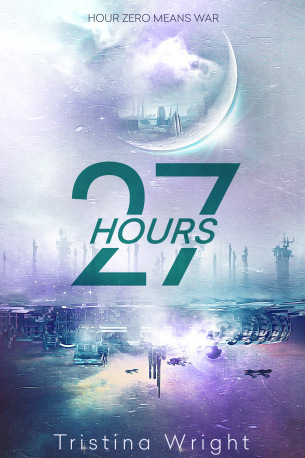 Photo credit: Goodreads
Photo credit: Goodreads
27 Hours by Tristina Wright (October 3)YA Sci-Fi
Goodreads summary:
Diversity note: I've heard the representation includes characters who are bisexual (#ownvoices), gay, pansexual, asexual, trans, deaf, and POC.
 Photo credit: Goodreads
Photo credit: Goodreads
Not Your Villain by C.B. Lee (October 5)YA Fantasy (Graphic novel)
Goodreads summary:
Diversity note: Bells is a trans guy.
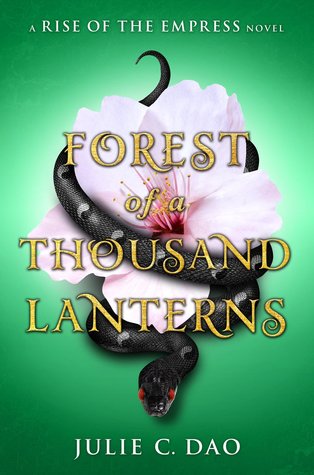 Photo credit: Goodreads
Photo credit: Goodreads
Forest of a Thousand Lanterns by Julie C. Dao (October 10)YA Fantasy
Goodreads summary:
Diversity note: This is an #ownvoices East Asian fantasy reimagining.
 Photo credit: Goodreads
Photo credit: Goodreads
Whichwood by Tahereh MafiMG Fantasy
Goodreads summary:
Diversity note: This is an #ownvoices dark Persian fantasy.
So that's a sampling of the books I'm psyched for this fall. What diverse falls books are you looking forward to?
Twitter-sized bite:





I've been psyched about most of these for quite some time. Because they sound incredible.
Without further ado, here are seven I'm looking forward to:
 Photo credit: Goodreads
Photo credit: GoodreadsThe Girl with the Red Balloon by Katherine Locke (September 1)
YA Historical Fantasy
Goodreads summary:
"When sixteen-year-old Ellie Baum accidentally time-travels via red balloon to 1988 East Berlin, she’s caught up in a conspiracy of history and magic. She meets members of an underground guild in East Berlin who use balloons and magic to help people escape over the Wall—but even to the balloon makers, Ellie’s time travel is a mystery. When it becomes clear that someone is using dark magic to change history, Ellie must risk everything—including her only way home—to stop the process."
Diversity note: Ellie is Jewish (#ownvoices).
 Photo credit: Goodreads
Photo credit: GoodreadsThey Both Die at the End by Adam Silvera (September 5)YA Contemporary
Goodreads summary:
"On September 5, a little after midnight, Death-Cast calls Mateo Torrez and Rufus Emeterio to give them some bad news: They’re going to die today. Mateo and Rufus are total strangers, but, for different reasons, they’re both looking to make a new friend on their End Day. The good news: There’s an app for that. It’s called the Last Friend, and through it, Rufus and Mateo are about to meet up for one last great adventure—to live a lifetime in a single day."
Diversity note: Mateo (and possibly Rufus?) are Latino, and I'm guessing they are queer boys too (#ownvoices).
 Photo credit: Goodreads
Photo credit: GoodreadsMask of Shadows by Linsey Miller (September 5) YA Fantasy
Goodreads summary:
"Sallot Leon is a thief, and a good one at that. But gender fluid Sal wants nothing more than to escape the drudgery of life as a highway robber and get closer to the upper-class―and the nobles who destroyed their home.
When Sal steals a flyer for an audition to become a member of The Left Hand―the Queen's personal assassins, named after the rings she wears―Sal jumps at the chance to infiltrate the court and get revenge.
But the audition is a fight to the death filled with clever circus acrobats, lethal apothecaries, and vicious ex-soldiers. A childhood as a common criminal hardly prepared Sal for the trials. And as Sal succeeds in the competition, and wins the heart of Elise, an intriguing scribe at court, they start to dream of a new life and a different future, but one that Sal can have only if they survive."
Diversity note: Sal is gender fluid.
 Photo credit: Goodreads
Photo credit: Goodreads27 Hours by Tristina Wright (October 3)YA Sci-Fi
Goodreads summary:
"Rumor Mora fears two things: hellhounds too strong for him to kill, and failure. Jude Welton has two dreams: for humans to stop killing monsters, and for his strange abilities to vanish.
But in no reality should a boy raised to love monsters fall for a boy raised to kill them.
Nyx Llorca keeps two secrets: the moon speaks to her, and she’s in love with Dahlia, her best friend. Braeden Tennant wants two things: to get out from his mother's shadow, and to unlearn Epsilon's darkest secret.
They’ll both have to commit treason to find the truth.
During one twenty-seven-hour night, if they can’t stop the war between the colonies and the monsters from becoming a war of extinction, the things they wish for will never come true, and the things they fear will be all that’s left."
Diversity note: I've heard the representation includes characters who are bisexual (#ownvoices), gay, pansexual, asexual, trans, deaf, and POC.
 Photo credit: Goodreads
Photo credit: GoodreadsNot Your Villain by C.B. Lee (October 5)YA Fantasy (Graphic novel)
Goodreads summary:
"Bells Broussard thought he had it made when his superpowers manifested early. Being a shapeshifter is awesome. He can change his hair whenever he wants, and if putting on a binder for the day is too much, he’s got it covered. But that was before he became the country’s most-wanted villain.
After discovering a massive cover-up by the Heroes’ League of Heroes, Bells and his friends Jess, Emma, and Abby set off on a secret mission to find the Resistance. Meanwhile, power-hungry former hero Captain Orion is on the loose with a dangerous serum that renders meta-humans powerless, and a new militarized robotic threat emerges. Everyone is in danger. Between college applications and crushing on his best friend, will Bells have time to take down a corrupt government?
Sometimes, to do a hero’s job, you need to be a villain."
Diversity note: Bells is a trans guy.
 Photo credit: Goodreads
Photo credit: GoodreadsForest of a Thousand Lanterns by Julie C. Dao (October 10)YA Fantasy
Goodreads summary:
"Eighteen-year-old Xifeng is beautiful. The stars say she is destined for greatness, that she is meant to be Empress of Feng Lu. But only if she embraces the darkness within her. Growing up as a peasant in a forgotten village on the edge of the map, Xifeng longs to fulfill the destiny promised to her by her cruel aunt, the witch Guma, who has read the cards and seen glimmers of Xifeng's majestic future. But is the price of the throne too high?
Because in order to achieve greatness, she must spurn the young man who loves her and exploit the callous magic that runs through her veins--sorcery fueled by eating the hearts of the recently killed. For the god who has sent her on this journey will not be satisfied until his power is absolute."
Diversity note: This is an #ownvoices East Asian fantasy reimagining.
 Photo credit: Goodreads
Photo credit: GoodreadsWhichwood by Tahereh MafiMG Fantasy
Goodreads summary:
"Our story begins on a frosty night…
Laylee can barely remember the happier times before her beloved mother died. Before her father, driven by grief, lost his wits (and his way). Before she was left as the sole remaining mordeshoor in the village of Whichwood, destined to spend her days washing the bodies of the dead and preparing their souls for the afterlife. It’s become easy to forget and easier still to ignore the way her hands are stiffening and turning silver, just like her hair, and her own ever-increasing loneliness and fear.
But soon, a pair of familiar strangers appears, and Laylee’s world is turned upside down as she rediscovers color, magic, and the healing power of friendship. "
Diversity note: This is an #ownvoices dark Persian fantasy.
So that's a sampling of the books I'm psyched for this fall. What diverse falls books are you looking forward to?
Twitter-sized bite:
What diverse books releasing this fall are you psyched about? Join the discussion on @Ava_Jae's blog. (Click to tweet)





Published on June 09, 2017 04:00
June 7, 2017
How to Translate the Story in Your Head Into Words on the Page
 Photo credit: Victoria Nevland on FlickrThe first step is understanding this is going to be a long process—and the end result may still look different than what you're picturing right now, and that's okay.
Photo credit: Victoria Nevland on FlickrThe first step is understanding this is going to be a long process—and the end result may still look different than what you're picturing right now, and that's okay.Next is understanding you'll never get that book you're imagining onto the page if you don't throw words on the page. And look, during that first draft, the words are not going to line up perfectly to that story you're imagining. A lot of times, the words are going to look pretty unrecognizable compared to what you want the end result to look like.
But the thing is, that's okay. The first draft, in many cases, is going to look like a steaming pile of garbage when you try to compare it to the masterpiece you imagined. Or at the very least it'll look like a pile of rubble you have to somehow sift through and rebuild before it'll start looking like the end result you want.
But again, that's to be expected. As I frequently remind myself, you can't edit a blank page. So fill those pages with words.
Once you've finished the first draft, it'll be time to take a break. How long is up to you—I like to take a month when I can, and even better if I can fill that month with other words—whether from another project, or from books. The goal is to remember as little as possible when you return to the manuscript, because the less you remember, the fresher it'll feel, and the fresher it'll feel, the easier it'll be to see the flaws.
Which, yeah, is the next step. Eventually time will come to pick up your manuscript and read it critically. This is the moment when you're going to see just how far the distance is from the book in your head to the book currently on the page. And it means paying attention to that distance and taking note of all the things you need to do to bring your manuscript closer to what you wanted it to be.
But more than that—it means being open to ways you could make it better than what you originally planned, too. Maybe the story took a turn you weren't expecting, or a character demanded more spotlight than your original plan. Maybe you have some potential possibilities you could expand on that would support your story and make it bigger—don't be afraid to go for those too. Sometimes big changes you weren't expecting are the best thing for the manuscript.
You'll have to revise on your own and decide what changes to go with. You'll have to put a lot of time and effort and emotion and know at the end, when you're tired and the manuscript is looking better—you're nowhere near done.
Because eventually will come time to work with others. Critique partners. Agents. Editors. And they'll all introduce ideas and possibilities you hadn't thought of. Some of them will bring them closer to the book you originally imagined. Some of them won't—but the different end point will be even better than you imagined. Be open to those ideas, and consider them carefully as you decide what to go with and what to ignore.
Writing a book is an evolutionary process. Very rarely do I end up with a final manuscript that looks exactly like I originally imagined—it's pretty near always better. Because by challenging myself to push harder, to explore that character and plot thread, to try something risky I hadn't originally imagined, I can build on the story in ways I hadn't imagined when I first got that story idea.
Eventually, you'll translate the story in your head into words on the page. And the story won't be the same, not really. But that's a good thing.
Have you ever experienced the evolution of story?
Twitter-sized bites:
How do you translate the story in your head into words on the page? @Ava_Jae shares some thoughts. (Click to tweet)





Published on June 07, 2017 04:00
June 6, 2017
Vlog: How to Choose Tense & Perspective
Choosing tense (past, present) and perspective (first, third) can be pretty tricky and varies manuscript to manuscript. Many of you have asked how to choose, so today I'm answering—or at least, answering how *I* choose.
RELATED LINKS:
First Person Dos and Don'ts (vlog)How to Choose POV Characters (vlog)POV Choices in YAWhy Use Past Tense?Why Use Present Tense?
How do you choose tense and perspective of a WIP?
Twitter-sized bite:





RELATED LINKS:
First Person Dos and Don'ts (vlog)How to Choose POV Characters (vlog)POV Choices in YAWhy Use Past Tense?Why Use Present Tense?
How do you choose tense and perspective of a WIP?
Twitter-sized bite:
Past or present tense? First or third person? How do you pick? @Ava_Jae vlogs on choosing tense & perspective. (Click to tweet)





Published on June 06, 2017 04:04
June 5, 2017
On Writing Careers and Fear
 Photo credit: zoxcleb on FlickrI'm the kind of person who likes—and often needs—to plan things out in advance. Whether it's plans to go out, plans for work, plans for trips, etc. I'm a planner both with my manuscripts and my everyday life. Planning makes me feel grounded, and allows me to prepare for what to expect for the day. It leaves me with a sense of solid surety that I can handle today's tasks.
Photo credit: zoxcleb on FlickrI'm the kind of person who likes—and often needs—to plan things out in advance. Whether it's plans to go out, plans for work, plans for trips, etc. I'm a planner both with my manuscripts and my everyday life. Planning makes me feel grounded, and allows me to prepare for what to expect for the day. It leaves me with a sense of solid surety that I can handle today's tasks.While there are certain big things I can plan—my education, for example, and large life decisions that are under my control—a writing career is not one of them.
Sure, I can plan for things on my end—how many manuscripts I'll write this year, and in what order, and when I'll aim to have things ready for my critique partners and agent. I can plan my manuscripts themselves and set up a pipeline of the next five to ten books I'll work on, assuming I come up with that many ideas. There are things even in a writing career that I can control and plan—but my career itself? The reviews I get, what books are published, when they're published, my advance, my royalties, what rights sell, etc.—those things, while they directly affect my life—are completely out of my control. I can't predict them. I can't plan.
Similarly, there are things I can't predict and plan for when writing a manuscript, either. Even though I plot every scene upfront, I can't really accurately predict how long the manuscript will be. I also can't plan for how the writing will turn out, or what characters will need work in revision, or what plot points I'll need to rework. I can't plan for whether the manuscript takes me longer than expected due to life or health things, and I can't plan for whether my CPs, my agent, or my editor (or new editors!) will like my work.
And you know? It's scary.
It's scary knowing that the truth is, I just don't know. It's scary thinking that I can put my heart and soul into a book and some people will still hate it. It's scary considering that much of my writing career is really and truly out of my hands—that what happens after I write the end largely depends on other people.
For unpublished writers, it's scary thinking this manuscript you're working on may never be published. It's scary sending out query letters and knowing chances are likely you'll get a bunch of rejections before you hear good news. It's scary wondering whether you'll ever finish this manuscript, whether you'll ever get to the query stage to begin with. And it's scary knowing even if you get an agent, even if you get published, you may be writing and publishing for a long time before you're making anywhere near a living wage from your writing.
On my end, I've learned to cope with the unpredictability of my career by setting the bar ridiculously low. When budgeting, for example, I don't factor in my writing income at all—so anything I do get is a bonus and I'm not fretting over when my next writer paycheck will come in because I've already figured out how to pay my bills without it. Though I've got lots of projects in the works, I don't assume any of the ones not under contract will ever sell—in fact, I tend to assume the opposite until I have an actual offer. It's a defensive mechanism to not get my hopes up, but it also allows me to plan other aspects of my life without trying to rely on a career that, quite frankly, I can't even begin to predict.
Writing and a writing career is scary, especially when you're like me and don't feel grounded without a plan. But in my experience at least, it's also incredibly rewarding.
I may not know what my life will look like in five years—at least, not with the writing aspect—and I may deal with frequent fears when it comes to my writing career. But fear and writing is just part of the process, and though it never goes away, it is something you learn to cope with, one day at a time.
What writer fears do you deal with?
Twitter-sized bite:
The unpredictable nature of a writing career is scary. But it's possible to learn to cope with it. (Click to tweet)





Published on June 05, 2017 04:00

